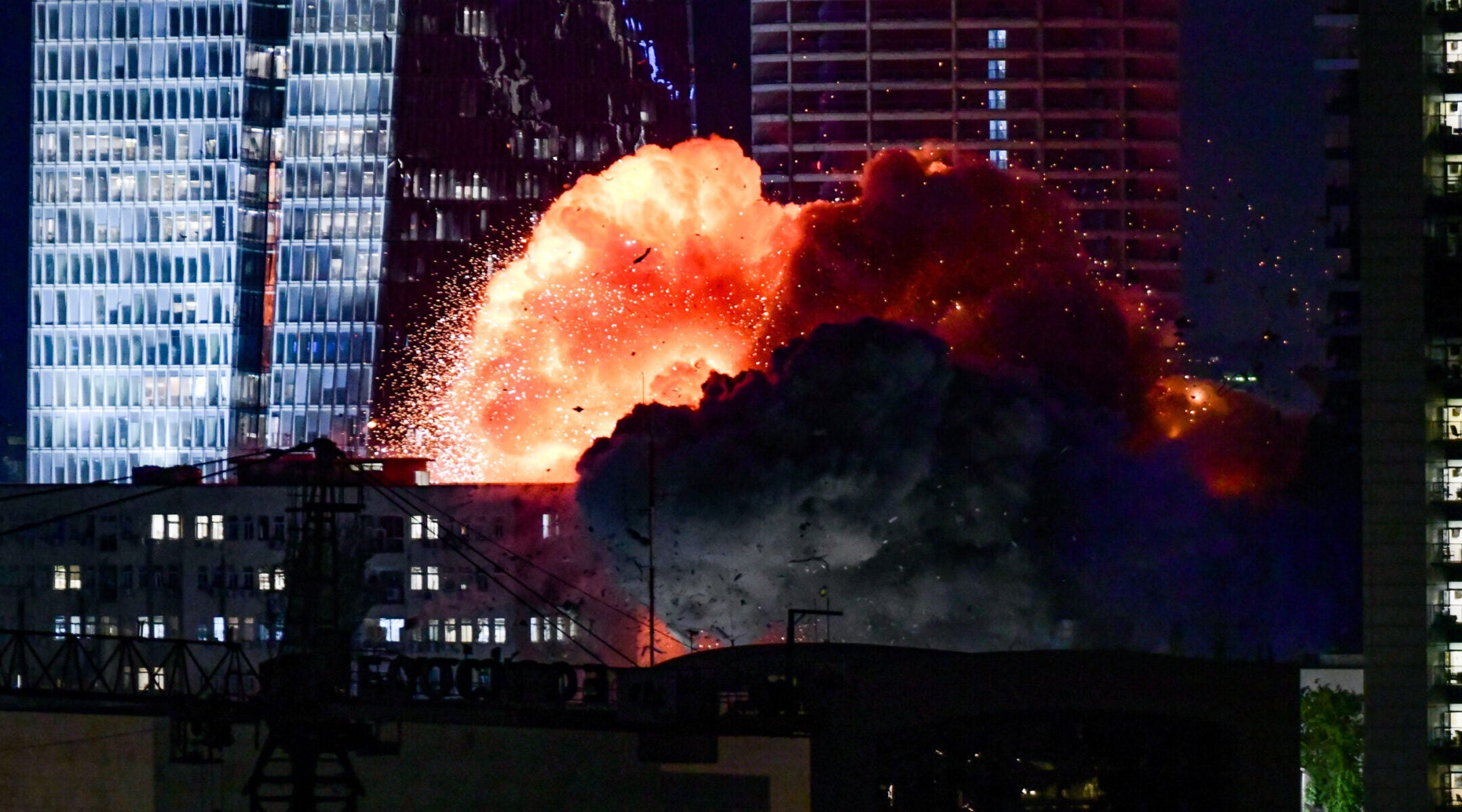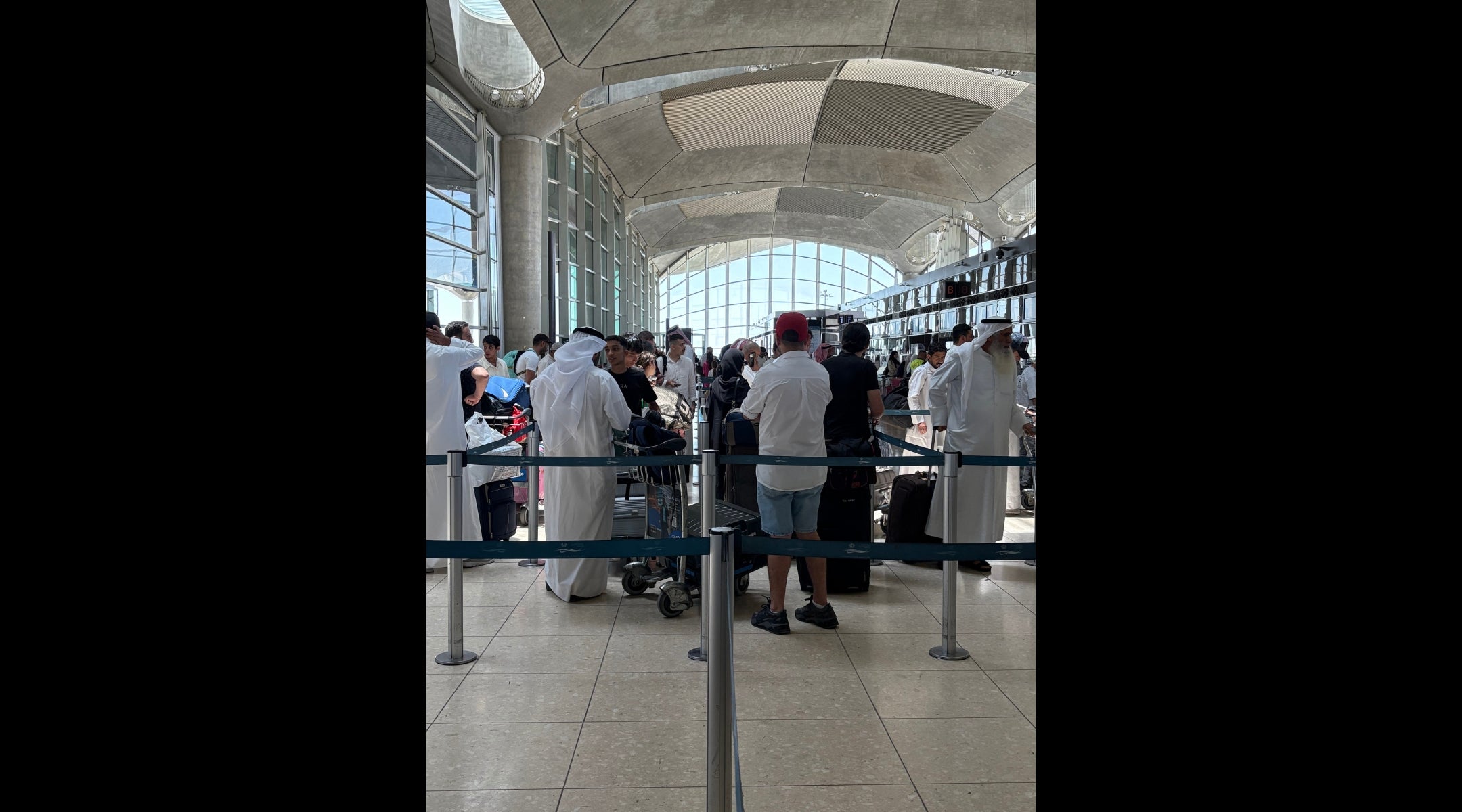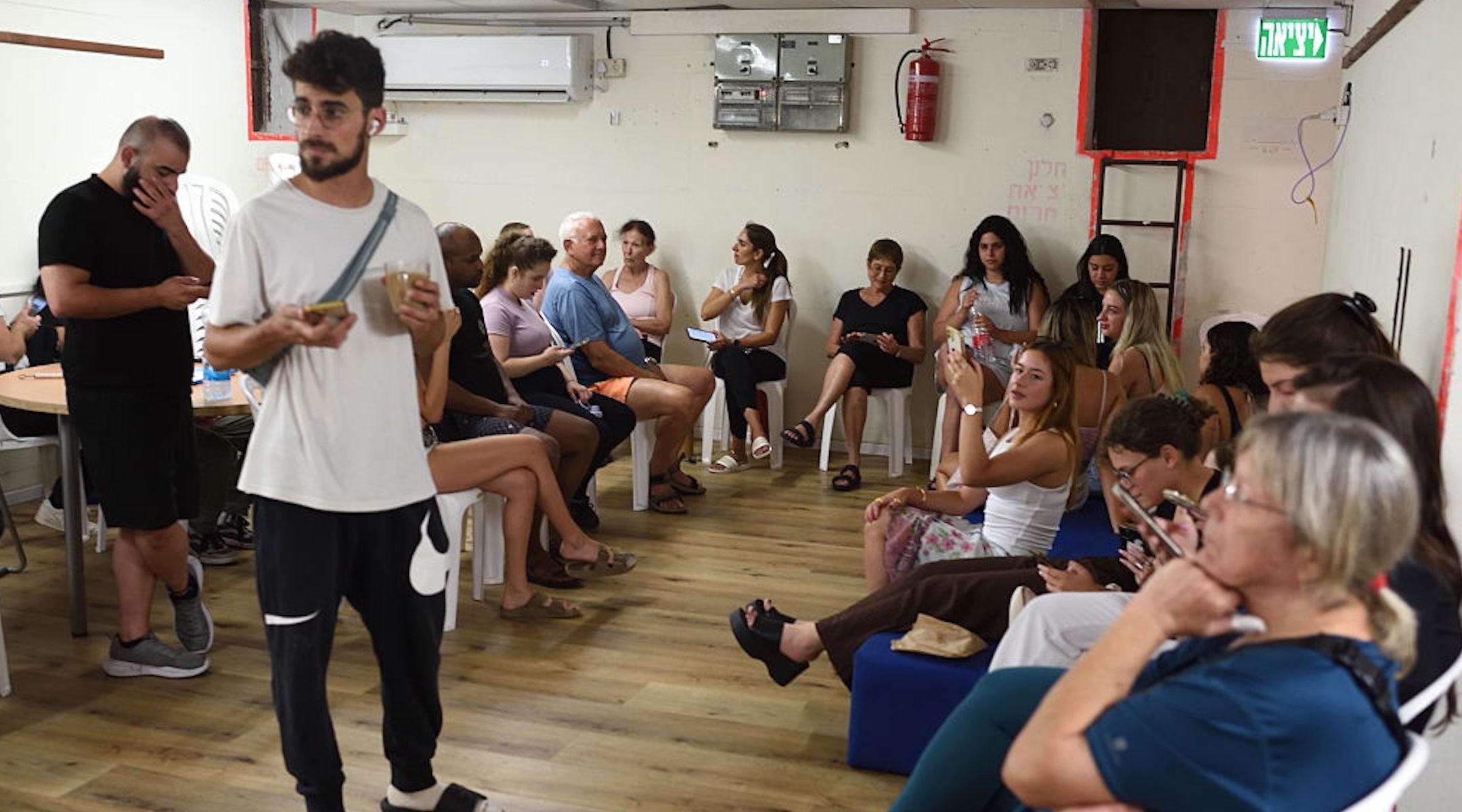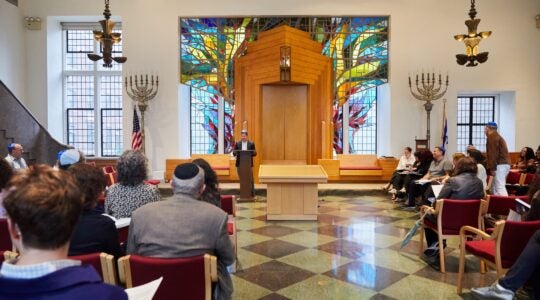On Sunday, June 8, New York City-based comedian Judy Gold flew to Tel Aviv’s Ben Gurion Airport. It was her second trip to Israel since Hamas invaded the country on Oct. 7, 2023, and this time, she was invited to a “Pride mission”organized by Israel’s Ministry of Foreign Affairs.
Gold had been invited on the mission by Sarah Milgrim, an Israeli embassy staffer who was murdered in an antisemitic attack in Washington last month. The five-day trip that was to culminate with Gold’s attendance at the famously exuberant Tel Aviv Pride Parade on Friday, June 13.
The parade, of course, never happened. That same Friday, at 3 a.m, Israel attacked military and nuclear facilities in Iran, the opening salvo of the war between the two countries. Israeli officials said the strike was triggered by Iran’s rapid progress toward a nuclear bomb and warned its citizens to steel themselves for a response.
In the days leading up to the parade, rainbow flags had lined Tel Aviv’s roadways and musical soundchecks filled the air along the beach. But by early that Friday morning, the Pride Parade — one of Tel Aviv’s biggest events of the year, with some 300,000 celebrants expected — was canceled. The streets of Tel Aviv were eerily quiet, empty of cars and pedestrians, as everyone hunkered close to home and their shelters.
“I did not sleep for five or six days,” Gold said about her stay in wartime Israel. “Maybe 30 minutes. I slept in my clothes. My bag was right there. Water. Passport. Everything in case you are there [in a bomb shelter] for days.”
Gold said that sirens indicating incoming missiles wailed every few hours. But, apparently, she never lost her wits or her sense of humor. “The one thing I did was brilliant: I took a mat from the hotel gym and all of a sudden everyone said, ‘I’m doing that,’” Gold recalled. “There were no mats left in the gym, but I hid it under a car in the parking garage. Thank God.”
Today, Gold is grateful to be back home, following a complicated return journey that, due to Israel’s closed airspace, involved a seven-plus hour stay at the border crossing between Israel and Jordan, a van trip to Amman, Jordan, followed by a flight to Dubai, followed by a canceled flight to Newark and then, finally a flight to JFK airport in Queens.
“There were so many times I thought I’m never going to get home,” she said.
Of course, Gold was hardly alone in her ordeal. As soon as Israel’s Home Front Command sends out a warning that a missile is headed their way, Israeli citizens are asked to go to the nearest safe room or shelter and stay there until they receive the all-clear announcement on their cell phones.
And it’s not only Israelis who are caught in the crossfire, facing danger and disrupted lives. Plenty of tourists found themselves trapped as Israeli airspace closed — including a large group of 2,800 young adults on a Birthright Israel tour, 1,500 of whom left Israel last Tuesday on a cruise ship bound for Cyprus.
Fortunately, Israel is now working on opening back up its airspace. But for several harrowing days, visitors to Israel who wished to repatriate endured multi-day odysseys that involved a combination of daring, luck and resolve. As I learned firsthand during my recent nine-day trip to Israel, I was hardly the only New Yorker with scary stories to tell.
I flew to Israel on Monday, June 9; my husband joined me a day later. We were there to help our daughter with her 3-year-old who had been hospitalized. (I’m happy to report that my grandchild is healthy again.) We arrived in Israel fully aware of the ongoing hostilities between Israel and Hamas. My daughter and son-in-law had an apartment with a mamad, or safe room, and we figured that, should the Houthis decide to send a rocket while we were in the apartment, we would be safe.

A missile attack on Israeli fired from Iran is intercepted, June 13, 2025. (Tomer Neuberg/Flash90)
But what we didn’t expect was a new war with Iran, one that brought with it showers of missiles, many in close proximity to our daughter’s apartment and, later, our Tel Aviv hotel. On Friday, June 13, we heard the missiles fall near the Kiryah, Israel’s Pentagon, which was a half-mile away from my daughter’s building. The metal cover on the safe room’s window shook and the loud swoosh that we heard as the missile fell scared us all.
This was not a war that we were reading about in the newspapers. This war was all around us, and it was terrifying.
Like Gold, New York-based cookbook author and food personality Jake Cohen had also flown to Israel for Pride. In his case, he co-chaired an LGBT mission organized by the Jewish Federations of North America.
In the days prior to Israel’s attack on Iran, Cohen had toured LGBT centers with his 100-person group, as well as sites that were hit hardest by Hamas’ Oct. 7 attacks, including Kibbutz Nir Oz and the site of the Nova music festival.
Cohen said his wartime visit was a memorable one, and that he was particularly struck by Israelis’ remarkable resilience as missiles flew. “Getting to understand something that we [normally] watch from afar, which is this concept of being so diligent in a moment during a crisis and then, in the next moment, going back to normal life,” he said. “There is something fascinating and magical in the way that a community can just hear sirens. No matter where you are, everyone bands together.
“So much of my community was there — gay Jews from across the world,” he added. “So it was my community: Israeli friends from New York who were coming home to see family and stay for Pride to Jews from across America I know. A highlight was going through an experience like this with community — having a support network of friends both local and from abroad was huge.”
As such, the regular sirens didn’t stop Cohen from enjoying his visit. ”I went to the beach every day,” he said.
Fortunately for Cohen, who had planned to return to New York on June 18, the war delayed his journey by only one day. He was able to fly directly from Amman to New York last Thursday.
Jewish communal leader Pamela Emmerich, however, wasn’t quite as fortunate. The president of American Friends of Hebrew University, Emmerich had arrived in Israel on Thursday, June 12th, to mark the 100th anniversary of the founding of Hebrew University in Jerusalem.
Emmerich’s 150-person Shabbat gathering — which was supposed to take place June 13 in Jerusalem — was cancelled, too. Early that Friday morning, as the war with Iran began, one of the planes carrying many of the participants was re-routed and returned to the States. By the time the service and dinner were scheduled to begin, only 67 of the would-be participants were in the country.
Fortunately, the extra days that Emmerich spent in Jerusalem were relatively calm.
“The King David is a fortress,” she said of the famous hotel where she stayed with friends. “We slept in our room and got up and would go to the shelter because the sirens [announcing incoming rockets] would go off.”
Like Gold, Emmerich spent seven hours at Israel’s border with Jordan. After overnighting at the Four Seasons in Amman, she was able to board a direct flight to JFK on Wednesday, June 18.
“I have a lot of respect for Israelis,” Emmerich said via telephone from her home in Westhampton, New York. “How they live like this is beyond me. I felt very fortunate — I’m leaving the country and I have Israeli friends who are trying to get home.”

The scene at Amman’s Queen Alia International Airport on June 18, 2025. (Rachel Ringler)
Gold said that she’s always loved Israel — in fact, one of her sons is scheduled to go back to Israel this summer to play basketball professionally. But now her love is even deeper, she said.
“They are truly fighting for the survival of the Jewish people,” she said via telephone from her apartment on the Upper West Side. You hear no one talking about, ‘F**ck the Palestinians, F**k Gaza.’ There is none of that. It is just survival and peace.”
“When the shit hits the fan, I would rather be with an Israeli than any other kind of human being,” she added. “I have so much respect — the places that stayed open, the people that got up at two in the morning to make pastries. This idea that you’re not going to interfere with our lives. We’re going to keep going, we’re going to clean up, we’re going to move on.”
Cohen, too, expressed admiration for Israelis’ can-do spirit. “Were all the restaurants open? No,” said Cohen, who’s next book, “Dinner Party Animal,” is coming out in September. “But, again, you get to see what’s open, and how the restaurants also navigate such a time like war in order to keep people fed.”
As for me, I, too, am in awe of the strength and spirit of Israelis. But I am also grateful for their skill with technology. One night, when we were asleep in our hotel, the sirens blared, warning us that we had 10 minutes to take shelter. In my sleep-addled state, I must have miscalculated — I assumed we had enough time to take the elevator from the 17th floor to the shelter.
But I was wrong. Once inside the hotel’s glass elevator, I saw a missile flying towards the hotel — it looked like an asteroid hurtling towards us. I prayed that the elevator was fast enough to make it down to the basement before the missile struck. Fortunately, an interceptor missile stopped the Iranian missile from reaching us.
Shaken but unscathed, my husband and I also made our way to the Allenby Bridge crossing between Israel and Jordan via bus. From there, we were driven to Amman airport, where we caught a flight to Frankfurt. We spent the night there — my first time in Germany, a country that I have avoided my entire life — and caught a flight to JFK airport last Thursday.
Like Cohen, Emmerich and Gold, I am grateful to be back in New York. But that doesn’t mean that a piece of me doesn’t remain in Israel, and probably always will.
“It was bittersweet to leave,” said Cohen. “I’m excited to get back there soon.”
The New York Jewish Week brings you the stories behind the headlines, keeping you connected to Jewish life in New York. Help sustain the reporting you trust by donating today.





